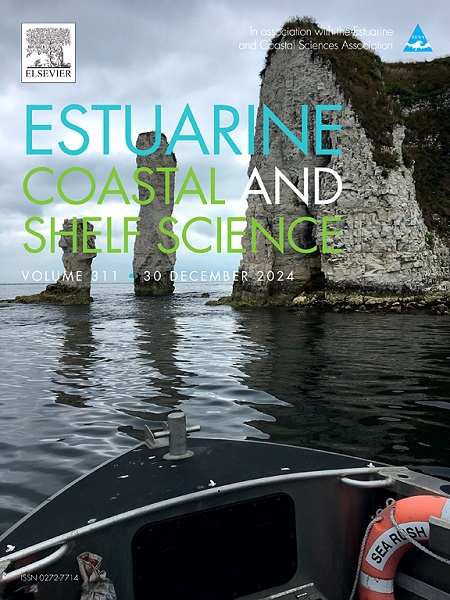Coral reefs in Vietnam: current state of research and future perspectives
IF 2.6
3区 地球科学
Q1 MARINE & FRESHWATER BIOLOGY
引用次数: 0
Abstract
This in-depth review investigated the status and prospects of coral reef research in Vietnam. Coral reefs along the coastline of Vietnam characterize a critical element of marine biodiversity and coastal ecosystem services in the country. The 3260 km coastline of Vietnam supports 1100 recorded coral species, and geographically, in addition to the archipelagos, the coral reef zones in Vietnam have been divided into three: the northern, central, and southern zones. Several hard and soft corals, reef fish, invertebrates, and endemic/rare species are found associated with reefs in Vietnam. However, the coral reefs in Vietnam are increasingly threatened by climate change, destructive fishing practices, coastal development, and pollution. Recent assessments show that more than 50 % of Vietnam's coral reefs are in poor condition, with declining live coral cover and biodiversity. Despite their importance and ongoing conservation efforts, research and monitoring remain limited in scope, duration, and geographic coverage in Vietnam. Research priorities include long-term ecological monitoring, studies on coral resilience to thermal stress and acidification, improved reef restoration techniques, and effective integration of socioeconomic and policy research. Technological advancements—such as remote sensing, environmental DNA (eDNA), and artificial intelligence—offer new opportunities for data collection and analysis. To ensure effective reef conservation, Vietnam must invest in scientific capacity, enhance inter-institutional collaboration, and embed research findings into marine governance frameworks. A multidisciplinary and progressive research agenda is essential for protecting and restoring Vietnam's coral reefs amid growing environmental and anthropogenic pressures. By aligning scientific innovation with policy and community-based management, Vietnam can build a more resilient framework for sustaining its coral reef ecosystems. Such an integrated approach will not only safeguard marine biodiversity but also secure the ecological and socioeconomic benefits that coral reefs provide for future generations.
越南的珊瑚礁:研究现状和未来展望
本文对越南珊瑚礁研究的现状和前景进行了深入的综述。越南沿海的珊瑚礁是该国海洋生物多样性和沿海生态系统服务的重要组成部分。越南3260公里的海岸线上有1100种有记录的珊瑚,在地理上,除了群岛,越南的珊瑚礁区被分为三个:北部,中部和南部地区。在越南的珊瑚礁中发现了几种硬珊瑚和软珊瑚、礁鱼、无脊椎动物和特有/稀有物种。然而,越南的珊瑚礁正日益受到气候变化、破坏性捕捞、沿海开发和污染的威胁。最近的评估显示,越南超过50%的珊瑚礁状况不佳,活珊瑚覆盖面积和生物多样性不断下降。尽管它们的重要性和正在进行的保护工作,但越南的研究和监测范围,持续时间和地理覆盖范围仍然有限。研究重点包括长期生态监测、珊瑚对热应力和酸化的适应能力研究、改进珊瑚礁恢复技术以及社会经济和政策研究的有效整合。遥感、环境DNA (eDNA)和人工智能等技术进步为数据收集和分析提供了新的机会。为了确保有效的珊瑚礁保护,越南必须投资于科学能力,加强机构间合作,并将研究成果纳入海洋治理框架。在日益增长的环境和人为压力下,多学科和进步的研究议程对于保护和恢复越南的珊瑚礁至关重要。通过将科学创新与政策和社区管理结合起来,越南可以建立一个更具弹性的框架来维持其珊瑚礁生态系统。这种综合办法不仅将保护海洋生物多样性,而且还将确保珊瑚礁为子孙后代提供的生态和社会经济效益。
本文章由计算机程序翻译,如有差异,请以英文原文为准。
求助全文
约1分钟内获得全文
求助全文
来源期刊
CiteScore
5.60
自引率
7.10%
发文量
374
审稿时长
9 months
期刊介绍:
Estuarine, Coastal and Shelf Science is an international multidisciplinary journal devoted to the analysis of saline water phenomena ranging from the outer edge of the continental shelf to the upper limits of the tidal zone. The journal provides a unique forum, unifying the multidisciplinary approaches to the study of the oceanography of estuaries, coastal zones, and continental shelf seas. It features original research papers, review papers and short communications treating such disciplines as zoology, botany, geology, sedimentology, physical oceanography.

 求助内容:
求助内容: 应助结果提醒方式:
应助结果提醒方式:


